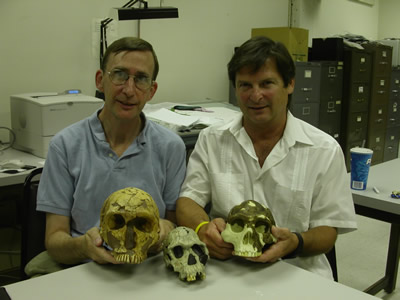|
Tom Wynn (left) is Professor of Anthropology at University of Colorado at Colorado Springs, where he has taught since 1977. He has published extensively in palaeolithic archaeology, with a particular emphasis on cognitive evolution. His early research focused on the archaeology of Homo erectus, and the evolution of spatial thinking. Only recently, under the prodding and inspiration of Fred Coolidge, has he ventured into the far more contentious seas of Neanderthal cognition. Frederick L. Coolidge (right) is Professor of Psychology at UCCS, where he has taught since 1979. He has published in the areas of neuropsychology, behavior genetics, and personality. In 2000, he took his vague idea, that decision-making capabilities of the frontal lobes may have played some role in human evolution, to Tom Wynn and under Wynn’s tutelage, they have published articles together in the Cambridge Archaeological Journal, Journal of Human Evolution, Journal of Anthropological Research, and others. Their work on Neanderthal cognition was recently featured in the magazine Science News. |
 |
The Topic and References
|
One of the greatest anthropological mysteries is the cause for the extinction of
Neanderthals. UCCS Professors Thomas Wynn and Frederick L. Coolidge have recently proposed a new solution based on paleoanthropological and neuropsychological evidence. Although Neanderthals had larger brains than modern humans (about 9% larger), Wynn and Coolidge suggest that a genetic mutation, about 100,000 years ago, rewired the frontal lobes of modern humans, which may have enhanced their working memory capacity. This resulted in their ultimate success in competition with Neanderthals to the point of the latter's extinction approximately 27,000 years ago.
Reprints Available: Email reprint requests to fcoolidg@uccs.edu or twynn@uccs.edu
|
